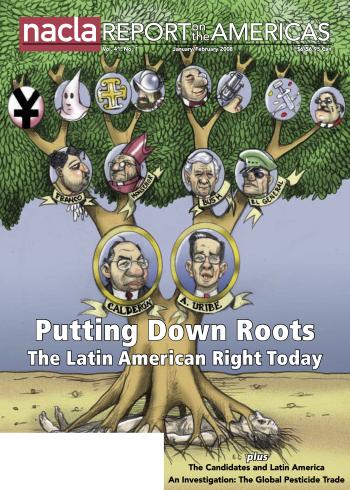Report
The triumph of the neoliberal Washington Consensus in Latin America has had a contradictory effect: It has increased the profits of the multinational corporations and improved the situation of elites, but it has eroded many of the old right-wing parties throughout the continent and opened cracks in the region’s political systems.
Benjamin Dangl and April Howard
Now that much of Latin America has shifted to the left, Paraguay remains a key Washington ally.
Two years into Evo Morales’s tenure as president of Bolivia, he and his party, the MAS, face difficult challenges. Though weakened by its collapse in 2003, the right is regrouping through a two-pronged strategy of promoting a regionalist vision of departmental “autonomy” and rebuilding a national party apparatus.
While many in the PAN see themselves as belonging to the “humanist” political center, the party, founded by Catholic conservatives in 1939, has traditionally been linked to the politics, intolerance, and traditionalism of the Mexican Catholic hierarchy; to the economic conservatism, now called neoliberalism, of Mexico’s entrepreneurial class; and to the many activist groups on the radical right. Of those ultra-right groups, the one that has attained the greatest position of power and influence within the party is the semi-clandestine El Yunque (the Anvil).
In October 2006, Nicaragua became one of a handful of countries, including Chile and El Salvador, where abortion is illegal without exception.
Outside Medellín, in August 2003, on a ranch on San Cristóbal’s border with Comuna 13, a common grave of 13 people was uncovered. The victims were some of the 70 people “disappeared” from Comuna 13 by paramilitaries who took over the ward following Operación Orión, an incursion of 1,500 soldiers and police, coordinated with paramilitaries and carried out in Comuna 13 in October 2002.

